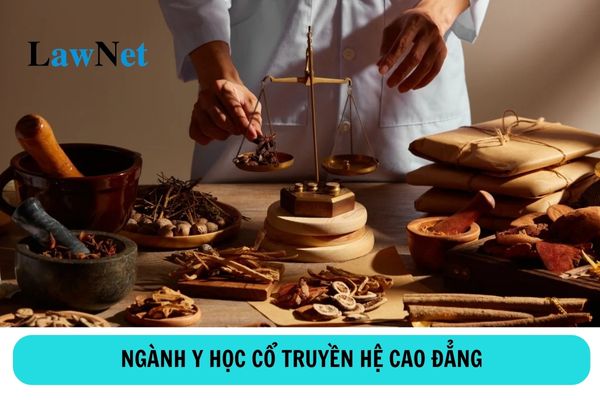Vietnam: What jobs can graduates of college-level traditional medicine do?
What jobs can graduates of college-level traditional medicine in Vietnam do?
Under Subsection 5, Section A, Part 1 of the Regulations on minimum knowledge and competency requirements for graduates at intermediate and college levels in the fields of health and social service (hereinafter referred to as the Regulations) issued together with Circular 54/2018/TT-BLDTBXH, graduates of college-level traditional medicine in Vietnam may do in the following jobs:
- Diagnosing and prescribing traditional medicine;
- Preparing traditional medicine;
- Acupuncture;
- Massage - acupressure;
- Guiding health exercises;
- Preparing medicinal herbs;
- Trading traditional medicine;
- Practicing traditional medicine at ward (commune) health stations;
- Practicing in traditional medicine diagnosis rooms.

What jobs can graduates of college-level traditional medicine in Vietnam do? (Image from the Internet)
What is college-level traditional medicine in Vietnam?
Pursuant to subsection 1, Section A, Part 1 of the Regulations issued together with Circular 54/2018/TT-BLDTBXH, the college-level traditional medicine is described as follows:
The college-level traditional medicine is a profession based on the philosophical foundation and medical knowledge accumulated from the experiences of many generations of Eastern physicians, passed down and developed by renowned domestic physicians, meeting level 5 requirements in the Vietnam National Qualifications Framework.
Traditional Medicine diagnoses diseases through methods: visual inspection (observing the patient and the circumstances), auditory inspection (listening to the sounds from the patient's condition and their narration), inquiry (asking the patient and their family about related matters), and palpation (examining using hands and instruments) to determine the disease state. Regarding treatment, Traditional Medicine uses methods such as acupuncture, internal or external medicine, and massage.
The acupuncture method is based on a detailed meridian system with hundreds of points on the body. These points and meridians are connected to various organs and systems in the body. For treating disorders in specific organs or systems, corresponding acupoints are targeted, along with additional points for support if necessary.
Notably, the meridian and acupoint system cannot be described using anatomical and physiological methods of Western medicine, although in modern times, acupuncture is used as an anesthesia method (local anesthesia) in certain surgeries (Eastern and Western medicine combination).
Northern Medicine consists of medicinal ingredients extracted and prepared according to Chinese books. Southern Medicine consists of medicinal ingredients discovered by local physicians within Vietnam. Famous physicians regarded as the founders of Vietnamese medicine are Le Huu Trac and Tue Tinh.
College-level Traditional Medicine physicians are provided basic knowledge of traditional medicine and are trained in skills for examination, diagnosis, and treatment of common diseases. They collaborate with Traditional Medicine doctors in patient care at Traditional Medicine hospitals, Traditional Medicine departments of general hospitals, clinics, health stations, Eastern medicine associations, and private Traditional Medicine clinics using traditional methods such as Southern-Northern Medicine, acupuncture, and massage-acupressure.
Additionally, they participate in the preparation and trading of medicinal herbs at production facilities, trading medicinal herbs and finished Traditional Medicine products.
Minimum knowledge volume: 2,220 hours (equivalent to 90 credits).
What are the minimum requirements for skills of graduates of college-level traditional medicine in Vietnam?
Pursuant to subsection 3, Section A, Part 1 of the Regulations issued together with Circular 54/2018/TT-BLDTBXH, the minimum requirements for skills of graduates of college-level traditional medicine in Vietnam are as follows:
- Effectively communicate with patients, their family members, the community, colleagues in the medical team, and in scientific activities;
- Proficiently use specialized Traditional Medicine terminology in communication with colleagues; critique and use alternative solutions;
- Develop plans for initial health consultation, care, and community health education;
- Perform disease examination methods, propose appropriate treatment plans, and confidently and comprehensively create Traditional Medicine medical records;
- Master techniques like acupuncture, electro-acupuncture, moxibustion, and cupping for treating common diseases;
- Master techniques for preparing common medicinal herbs;
- Perform fundamental health exercise movements, select and guide specific exercises for each patient for prevention and treatment;
- Master massage and acupressure techniques for preventing and treating diseases;- Accurately prescribe and modify herbal formulas to treat common diseases;
- Collect, evaluate, store, and selectively use information sources for self-learning and professional development;
- Effectively convey information, ideas, and solutions to colleagues, and guide students in practical knowledge and skills in the profession;
- Utilize basic information technology according to regulations; exploit, process, and apply information technology in professional work;
- Use basic foreign language skills, reaching level 2/6 in Vietnam's foreign language proficiency framework; apply foreign language skills in professional work.

